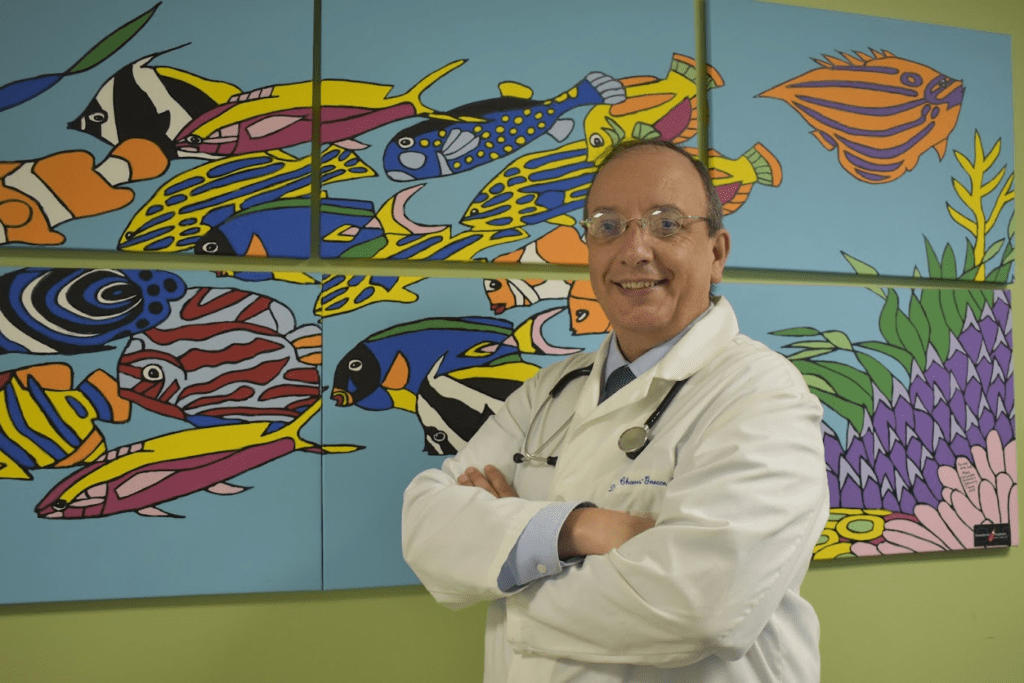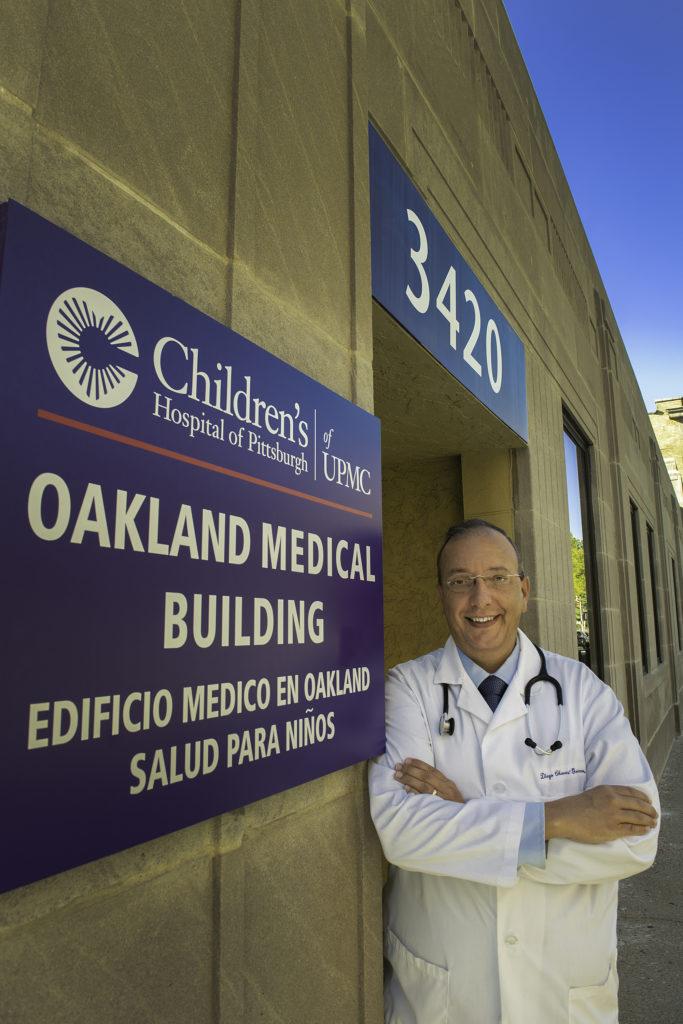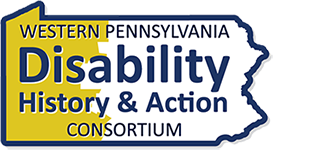
By Heather Cowie, Project Scholar
Healthcare disparity is an area where the intersection of disability and racial inequity becomes plainly evident. Barriers to access present challenges to historically marginalized groups, making it difficult to receive the care and support they need.
One person working to address those barriers in Western Pennsylvania is Dr. Diego Chaves-Gnecco, developmental-behavioral pediatrician and founder of the Salud Para Niños program at UPMC Children’s Hospital.
Born December 8, 1969, in Bogotá, Colombia, Dr. Chaves-Gnecco’s interest in medicine was cultivated by his family. His mother was a physician and his grandfather was the first endocrinologist in Colombia. Later, after deciding to study pediatrics in medical school, his specialization in developmental and behavioral services was in part influenced by having an uncle with cerebral palsy.
Dr. Chaves-Gnecco received his MD degree from Pontificia Universidad Javeriana in 1994. He came to Pittsburgh in 1998 to complete a fellowship in clinical pharmacology, with a plan to return to Colombia a year later. Ultimately, however, he opted to stay in Pittsburgh to pursue a master’s degree in public health at the University of Pittsburgh, and completed a residency to become a pediatrician in the United States.
It was during this residency that he joined the Community Oriented Residency Education (CORE) program at UPMC Children’s Hospital of Pittsburgh, which trains leaders in child advocacy and community health, focusing on under-served populations. In 2002, as a part of his CORE training, Dr. Chaves-Gnecco proposed the first bilingual-bicultural pediatric clinic in southwestern Pennsylvania. This clinic would go on to become the Salud Para Niños program, which aims to provide culturally and linguistically competent primary care for children and their families. The program holds a weekly mobile clinic in the Beechview neighborhood, and provides free services to children without health insurance. While the clinic is intended for Latino families, it has served children from many different backgrounds, most recently children arriving from Ukraine.

Through this work, Dr. Chaves-Gnecco quickly realized that disability support and advocacy was needed to improve healthcare outcomes for local Latino families.
“The Latino population in Pittsburgh has a unique characteristic, and that is that it’s an ‘invisible’ community…It’s invisible because the percentage of the population is not as big compared to the rest of the state or the rest of the nation, and it is also invisible because the community doesn’t live in one neighborhood,” he explained. “If you look within the Latino population at members of the community who might have a disability, this actually becomes even more important, because if the population itself is invisible, you can imagine how much more invisible are the children, patients, adults, members of the community who might have a disability.”
The under-diagnosis of autism is one area that Dr. Chaves-Gnecco cites as a challenge in pediatric care. The Center for Disease Control and Prevention states that Latino children are 1.6 times less-likely to be diagnosed with autism than their white counterparts. “A lot of members of the [Latino] community don’t know what autism means,” he said. “It was clear that there is a lot of work to do in terms of raising awareness about autism in general, and in particular in the Latino community.”
Harmful misconceptions about children from different cultural backgrounds held by healthcare providers and educators also create an obstacle to accessing support. “The other problem that happens is that sometimes people tend to attribute some of the characteristics of the condition to being raised in a bilingual environment…Unfortunately, to this day we still sometimes see kids who were referred to us late with concerns of autism. They were not referred to us because people attributed the language delay to being raised in a bilingual environment,” he said. “That was another thing that I quickly realized we needed to do a lot of education [about], to make sure that families, patients, providers, physicians, pediatricians understood that bilingualism is by no means a reason to account for language delay.“
In his work with the clinic, he Initially proposed support groups for members of the Latino community caring for children with disabilities. “Now, there are many organizations that are providing this service, and I’m happy to report that there is much more than what we had twenty years ago when we first started the clinic. But I do feel that still there is a lot of work to do in terms of addressing the needs for our members of the community who have some type of disability.”
Dr. Chaves-Gnecco believes that continued outreach to raise awareness about disabilities and the expansion of healthcare and support services for families are crucial to caring for the Latino community. “Those are some of the things that we can improve, that I will look forward to [making] a difference, making sure that the services reach out to minority communities, to underserved communities, based on race for example. We know that, for example, sometimes African-American kids are under-diagnosed with certain conditions and they don’t receive the services that they need.”
In Pennsylvania, the Alliance for Infants and Toddlers provides one such service, offering early-intervention service coordination for children with developmental concerns, from birth to age three. However, once children reach the age of three, the gap in services begins to widen. At that point, “…the families have to initiate the process,” said Dr. Chaves-Gnecco.”We have a lot of families that fall through the cracks, they don’t continue receiving services once the child turns three. So that’s an area where we could make some improvements, making the referral process much easier [and ensuring]that families understand the importance of continuing therapies.” He also noted that improving the long waiting lists for disability evaluations, which can be as long as a year or more, and having more healthcare professionals trained and willing to provide high-quality, evidence-based therapies such as Intensive Behavioral Health Services and Applied Behavioral Analysis (IBHS-ABA), would alleviate some existing healthcare barriers that Pennsylvanians with disabilities face.
“One of my dreams will be to see that all children in Pennsylvania can have health insurance… regardless of many characteristics that are limits for them to get [it],” he said. “In Pennsylvania, we still have about 24,000 children who won’t qualify for any type of insurance— no Medicaid, no CHIP (Children’s Health Insurance Program), no commercial insurance.” If any of those children happen to be diagnosed with a chronic condition or disability such as autism, they do not have insurance to cover therapies besides those that are provided by their schools. “It will be ideal [to] make changes in the state legislation to make sure that we have true universal health coverage for children in our state.”
When asked about his goals for the future, Dr. Chaves-Gnecco hopes to continue his work increasing equity in healthcare access. “Since the beginning, we had a monthly clinic for children who didn’t have insurance. In 2019, 2020 right before the pandemic started, we expanded our services to have a weekly clinic. But the need continues growing…so my hope for the future is to not only maintain the program that we created 20 years ago, but also to be able to continue growing as the needs of the community continue growing.”
“When you have people who have different abilities, different conditions, we need to adapt, and that’s also true when you have people from different backgrounds, different cultural values, and different languages,” he explained. “It’s a work in progress, we need to make sure that everybody feels included, that we have equity… that every day we do better for others.”
Dr. Chaves-Gnecco has received numerous honors and accolades for his work. He was named Pediatrician of the Year by the American Academy of Pediatrics in 2019, and received the F. Edwards Rushton CATCH (Community Access to Child Health) Award in 2017. In 2012, an official mayoral proclamation named October 3rd “Dr. Diego Chaves-Gnecco’s Salud Para Niños Day” in the city of Pittsburgh.


